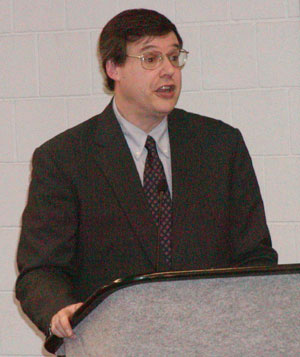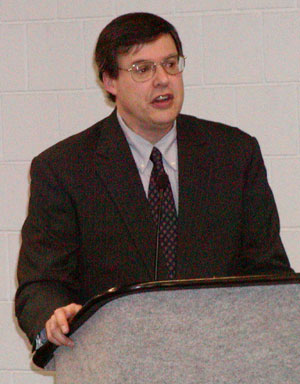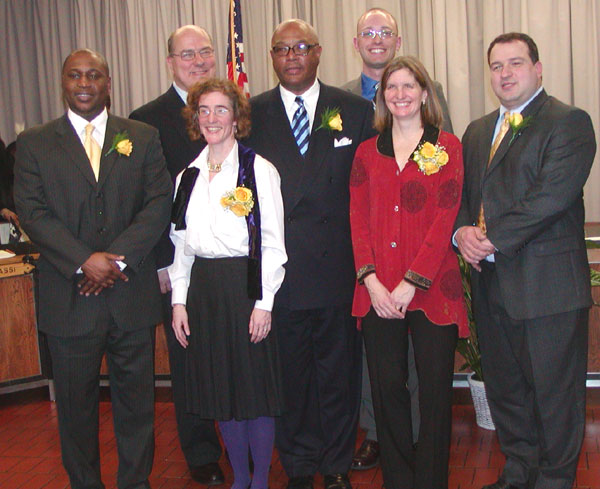Glenn Koocher's remarks at the 2006 School Committee
Inaugural – January 2, 2006
|

Glenn Koocher
Cambridge School Committee, 1974-1985
|
Inaugurated:
Alfred Fantini (Elected in 1981 – this is his 12th term – he lost once in between)
Joseph Grassi (Elected 1993 – this is term 7)
Nancy Walser (Elected in 1999 – this is term 4)
Donald Harding (Elected in 2001 – this is his 3rd term)
Patty Nolan (First elected, 2005)
Luc Schuster (First elected, 2005)
Kenneth Reeves (Previously served as Mayor 1992-93 and 1994-95)
The inauguration continues a tradition of citizen oversight of the public schools – a concept that dates back 370 years. No sooner was Harvard College organized than the town selectmen authorized our first public school to ready students for it.
In 1655, the selectmen voted
to increase the salary of 20 pounds for the head of the school, beginning a 350 year tradition of paying school leaders not to leave.
The School Committee itself was formally created as distinct from the selectmen in 1795 making it the oldest, continuing elective body in the city. The School Committee ran the schools themselves and didn’t feel the need for a superintendent until 1868.
And, although they did not have the right to vote in state or national elections, women have voted for and sat on the Cambridge School Committee since 1880.
|
|
Distinguished Alumni of the Cambridge School Committee have left their mark and have included:
- Speaker of the US House of Representatives, Tip O’Neill
- Deputy Director of the Central Intelligence Agency, Robert Amory
- The historian of colonial America, Richard Gummere
- The distinguished suffragette Florence Lee Whitman who became the first woman to serve on the City Council as soon as the XIXth Amendment was adopted.
- Alice Longfellow (served in the 1800s), who lobbied successfully to have an elementary school named for her father, the poet. (Longfellow’s reputation was in decline as a poet, and the school was opening on the 50th anniversary of his death.)
But distinction also finds a home in groups, and the School Committee as a board has achieved national attention on several occasions.
- In the early 1950s, this board distinguished itself by refusing to impose censorship, standing up to the pressures of McCarthyism and allowing controversial speakers to use the public schools for public forums, including the Socialist Harold
Laski.
- The first to lift the ban on married women being able to teach.
- The first to prohibit discrimination based on sexual orientation.
- The first district to desegregate voluntarily without a court ordering them to do so.
|

|
This is the 33rd Inauguration of the school committee under our Plan E government. It is unique in the United States – no longer in use elsewhere – but still a state of the art form of representative democracy.
Plan E was instituted in response to a crisis of confidence in local government driven by corruption, secrecy, and patronage. In 1941 people put their faith in a system of proportional representation and professional management, and recommitted itself to oversight of the public schools by the people and the representatives they
select.
We no longer worry about corruption in our city. Patronage is not what drives the electorate. Your proceedings are open to all in this building and at home to every person.
But the problems of a different sort that we face are no less serious than those our fellow citizens confronted sixty five years ago. Turmoil in the world challenges our collective wisdom to solve our problems. The work of public schools is more complex than ever before.
Public Education, however, faces greater challenges and even threats we could not have imagined years ago. Forces would assault the public schools, privatize them, and even take from the people the right to govern their schools, and substitute a political ideology for the best judgment for the collective wisdom of stakeholders like parents, the administrative leadership and faculty, and publicly elected officials. They would deny you the resources to do your work. They are real.
In confronting these challenges, the role of the school committee member as the public policy maker, guardian of the public treasury, and voice of the people in local American democracy has never been so important.
You are fortunate that you have before you a School Committee that stands second to none
in its understanding of its role, its dedication to the city, and, more importantly, its ability to preserve and protect your public schools, so that 65 years from now, some of you may sit in this room, look back, and appreciate their work.

L to R – Cambridge School Committee members Richard Harding, Fred Fantini,
Patty Nolan, Mayor Ken Reeves, Luc Schuster, Nancy Walser, and Joe Grassi


